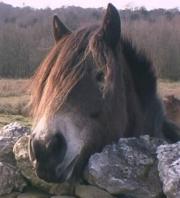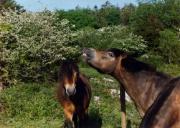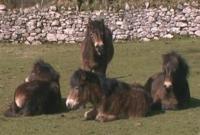|
|
The Exmoor Pony -
Conserved by Conserving |
 |
In the beginning there were British hill ponies
and woolly mammoths and you could walk to Calais. During the past 130,000 years
of progress, we have lost all of that. Well nearly - there're still a few
Exmoor ponies around, the only equines with the characteristics of their
country cousins from the cave paintings. Unfortunately, at the beginning of the
21st century, Exmoor ponies are paddling around in the shallow end of the gene
pool, on the cusp between endangered and critically endangered.
Why the world isn't beating a path to the door
of every Exmoor breeder in the country, I just don't understand. They are
noble, intelligent and beautiful animals. They are interested in what goes on
around them and will readily form strong relationships with one another and
with their owners.
Just when it
looked like they might disappear down posterity's plug hole, the survival
characteristics that have kept them going for tens of thousands of years may be
about to ensure their continuation for the future.
|
 |
The crisis in agriculture, the BSE debacle and
falling livestock prices have left our wildlife organisations with enormous
problems in finding grazing animals to manage national nature reserves, sites
of special scientific interest and other sites of special biological diversity.
Where grazing animals are available, they are often modern breeds, unable to
take advantage of the rough grazing that is a feature of these special sites.
Local enthusiasts and the organic producers who use the rare breeds of sheep
and cattle that are more suitable for the job are not widely available.
Enter the Exmoor pony. A hundred thousand years
of interacting with, but not damaging, its environment. The grazing animal that
eats the rough stuff; molinia. purple moor grass, tor grass, common rush; that
will happily work all day on wetland sites; that will work outside in all
weathers; that will 'do well' on vegetation that no other common herbivore will
look at. The browsing animal that helps control scrub and bramble. And the
conservation grazer that doesn't eat the flowering plants; that encourages the
orchids, the devils bit scabious and the other plants upon which the
invertebrates depend. The Gait Barrows herd are employed to support and help
regenerate, the high brown fritillary butterfly, Britain's rarest. Exmoor
ponies in other parts of the country are similarly employed on behalf of
fritillary butterflies and other rare species of flowers, plants and
invertebrates.
The eruption of demand for the Exmoor pony as a
conservation grazer has brought with it some problems. When farmers grazed
nature reserves they brought with them their experience of animal husbandry and
management and the warden did not have to worry about welfare issues. Today
wardens are having to acquire their own animals to work on their own reserves
and the animal's welfare is suddenly their responsibility. The experience of
managing ponies as agricultural animals has all but disappeared from Britain.
To whom do wardens turn for guidance in such circumstances?
Enter EPIC, Exmoor Ponies in Conservation. They
have turned to EPIC as a hot line source of information and as projects are
being established all over the country, we are increasingly unable to do all
that is needed. What is required is a network of interested and
equine-experienced potential volunteers who would like to work with local
nature reserves and their Exmoor workforce to advise and assist. When to worm,
trim feet, call the vet, move to other grazing etc. It is our experience that
reserves will pay their volunteers' expenses and that working with small herds
of Exmoor ponies in wild and beautiful places is so rewarding in its own right.
 |
If you would like
to find out more about conservation grazing with Exmoor ponies, there is a
website with information about the Gait Barrows herd, copies of EPIC's
newsletter, Epicentre and related information:-
click here
The Barn Moss Lane Silverdale Lancashire LA5
OSS
Phone 01524 701470 Fax 01524 702491
email epic@quista.net
|
|

